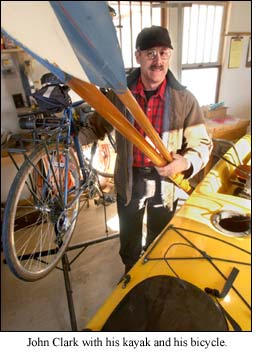Kayaking, Bicycling, and Prostate Cancer
John Clark is an athlete a middle-aged athlete who was treated for prostate cancer last year.
His career, until he retired at 54, was athletic director for St. Lawrence University. His children, seven of them, are athletes too.

Naturally enough, Clarks first retirement challenge was a physical goal a solo bicycle trip across Canada. Never mind that bicycling wasnt one of his sports.
September of 2001, three months after his retirement, he took off on his custom-made bicycle. Thirty-eight days later, he had pedaled 3,000 miles.
He came back in great physical and mental shape and proud of himself; that was, until someone pointed out to him that he hadnt really gone all across Canada. To accomplish that trip, he would have had to cross water and vast regions with no roads.
John took the comment as a dare. He would finish the trip by kayaking 1,500 miles of Canadian riverways. No matter that he had never been in a kayak.
After his bicycle trip, John skipped his 2002 physical; he thought he didnt need one because he was in such good shape.
But his wife said, Before you start this kayak trip, you get yourself a physical.
In February of 2003, John was diagnosed with prostate cancer. The kayak trip was on the back burner.
In May of 2003, John became a surgical patient of Dr. Catalona.
Now, months after a radical prostatectomy, the trip is on the front burner again. This May, a year after his operation, 57-year-old John Clark will launch his kayak under the same international bridge in Ogdensburg, NY that he crossed with his bicycle. (The URF will keep track of his progress on our website: www.drcatalona.com)
The cancer changed Johns motivation for the trip.
When I first planned the trip, I wanted to show people over 50 that they could still do their dreams. Now, I want other men to see that getting prostate cancer is not the end of their life adventures.
Also, he wants to give publicity to the importance of getting tested.
I didnt have a single physical symptom when my test result came back with a PSA of 11. My sons could have fallen into the same trap, but wont now, he said.
Johns lessons havent all been physical. He has learned a lot about making his dreams come true.
“I’ve opened a new line of communications.”
Anything you want to do, you dream it first. But it doesnt materialize until you speak it.
Then he begins his research. In the case of his bicycle trip, and now his kayak trip, he finds the experts, contacts them and asks the important questions. He reads all the material he can find. He makes his lists: equipment, food, schedules, routes, emergency preparation, etc. He gets the best equipment; the kayak, like his bicycle, is custom-made and adapted for rowing.
But once he starts the trip, its all about the experience.
On the bicycle trip, he saw salmon in the Pacific Ocean, glaciers in the Rockies, lightning on the Great Plains, bear and moose in the Eastern Forests.
He visited with people who live in towns with names of Kamloops, Hope, Swift Current, Deep River, Medicine Hat, WaWa, YesNo, and Moose Jaw.
John has also learned a lot about dealing with prostate cancer, and he advises handling it the same as someone would in going after a dream.
The hardest thing I did was to make the first phone call for help. But after admitting the bad news, I used all my skills to find out about prostate cancer and then made the best plans for treatment.
John is ready for the physical challenge of the kayak trip, but hes gotten in physical shape many times before.
“I want the kayak trip to say something about prostate cancer and life.”
The newness of this trip will be his emotional strength and openness, and he says that they came from his experiences with prostate cancer.
I know its hard to believe, but Im not unhappy that I had prostate cancer. Its made a lot of things better in my life, he said.
One of them is his connection with his wife.
Men worry about prostate cancer and its effect on their sexual relationships. My wife and I have seven children, but we didnt really talk about sex. When faced with the threat of having it taken away, we talked about it. We learned to communicate about our desires.
Im potent after the RRP, but my wife and I changed what we do. Our physical sharing is better and more meaningful.
And Ive been able to open up a new line of communications with my wife. Its wonderful.
The kayak trip John says its going to be better too.
The bicycle trip I did for myself. The kayak trip is about much more. Im looking forward to the beauty of it, to the challenge of it. But I want to make it say something about prostate cancer and life.







